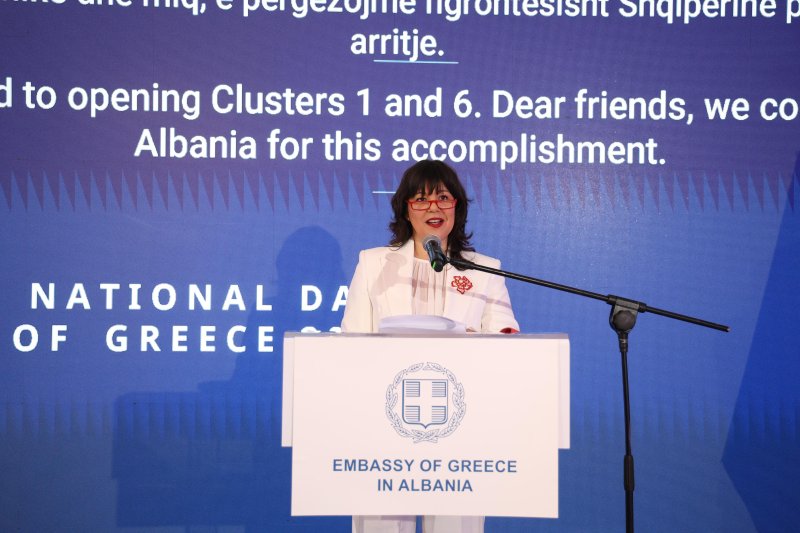'A Neighbor Is Closer Than a Brother'
The Greek Embassy in Tirana hosted a reception yesterday in honor of Greek National Day at the Cultural Center of the Resurrection of Christ Cathedral in the capital. Attendees included Albania’s Minister of Foreign Affairs, Igli Hasani, other ministers, members of parliament, Democratic Party leader Sali Berisha, representatives of the diplomatic corps, the Orthodox Church, members of the media, and other distinguished guests.
The Greek Ambassador to Albania, Ms. Konstantina Kamitsi, opened her address by paying tribute to the late Archbishop Anastasios, acknowledging the profound loss his passing represents for the Orthodox Church. “I would like to sincerely extend my best wishes to His Beatitude, the newly elected Archbishop of Tirana, Durrës, and all Albania, Ioan, for strength and success in his service to the Autocephalous Orthodox Church of Albania,” the ambassador stated.
She emphasized the continued relevance of the Greek Revolution of 1821 in today’s world, describing it as an enduring symbol of a nation’s fight for independence, freedom, and statehood.
“Greece, as one of the longest-standing EU and NATO member states, is deeply invested in strengthening security, stability, and economic development in the Western Balkans—an objective that will be furthered through EU enlargement,” Ms. Kamitsi underlined.
She also noted that Greece has been elected as a non-permanent member of the United Nations Security Council for the 2025-2026 term, following Albania’s tenure in the same position from 2022-2023.
“With full awareness of the responsibility that this role entails, Greece aspires to serve as a bridge—or, if you will, an honest mediator—between North and South, East and West, contributing in a stabilizing and constructive manner. As the Greek Prime Minister stated during his address at the 79th Session of the UN General Assembly, Greece will take its place on the Security Council with a commitment to upholding our fundamental principles: Dialogue, Diplomacy, and Democracy,” the ambassador remarked.
Highlighting Greece’s proactive role in regional and global affairs, Kamitsi recalled Greece’s longstanding support for Western Balkan integration into the EU, first expressed in the Thessaloniki Declaration of 2003. “Since that time, Greece has recognized the geopolitical importance of this region’s inclusion in the European family. Our vision for the Western Balkans within the EU has always aimed at reducing tensions, strengthening the rule of law, and advancing fundamental freedoms in the region.”
She stressed that Albania’s EU accession would be a significant achievement for Greece as well, as it would reinforce shared interests within the European framework. “This is yet another reason why Greece fully supports Albania’s swift accession to the EU, in full compliance with community standards and fundamental rights,” the ambassador stated.
Ms. Kamitsi also highlighted the role of the Greek Ethnic Minority in Albania and the Albanian community in Greece as vital contributors to the strengthening of bilateral relations. “These communities have long been, and will continue to be, pillars of trust and cooperation between our countries, as well as key drivers of political and economic collaboration.”
Addressing shared regional challenges, the ambassador emphasized the need for collective efforts to tackle issues such as security, climate change, and economic development. “The challenges facing our region today—be it in collective security, political stability, or the daily efforts of governments to improve citizens’ lives—require close cooperation. The war in Ukraine has demonstrated this need, as have the efforts to manage climate change, raise living standards, and build the necessary infrastructure for energy security and regional connectivity. These challenges cannot be solved by any one country alone; they demand joint efforts.”
Turning to economic ties, Kamitsi underscored Greece’s role as a key trade partner for Albania and a driving force in regional entrepreneurship. “Greece ranks fourth in terms of Albanian imports and third in terms of Albanian exports. Moreover, Greece’s investments in renewable energy have transformed it into a major energy hub for the broader Balkan region.”
The ambassador also highlighted the cultural dimension of Greek-Albanian relations. Over the past year, the Greek Embassy in Tirana, in collaboration with the Consulates General in Gjirokastra and Korça, has organized numerous cultural events spanning music, theater, and fine arts, as well as discussions on social issues such as women’s role in modern society.
“The similarities between our two peoples are vast, extending beyond our Mediterranean temperament,” Kamitsi noted. “I will conclude with an expression shared by both our nations—one that embodies the need for unity and friendship. Because friendship and cooperation pave the way for progress, and we must ensure they are not overshadowed by the voices of nationalism and intolerance: ‘A neighbor is closer than a brother.’”
The event concluded with performances by two polyphonic singing groups: the ‘Antigonea’ Polyphonic Group from the Dropulli Cultural Dance Association and the ‘Ladies of Selo’ Polyphonic Group from Upper Dropulli. / ADN













